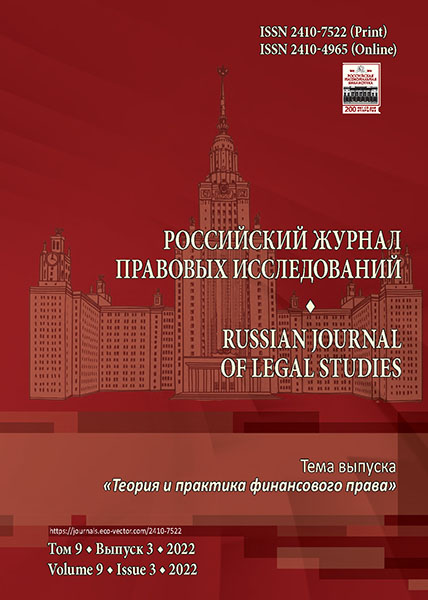Особенности института признания гражданства Российской Федерации
- Авторы: Пирязева Н.Е.1
-
Учреждения:
- Институт законодательства и сравнительного правоведения при Правительстве Российской Федерации
- Выпуск: Том 9, № 3 (2022)
- Страницы: 23-29
- Раздел: Конституционное право
- Статья получена: 08.08.2022
- Статья одобрена: 18.08.2022
- Статья опубликована: 25.10.2022
- URL: https://journals.eco-vector.com/2410-7522/article/view/109673
- DOI: https://doi.org/10.17816/RJLS109673
- ID: 109673
Цитировать
Полный текст
Аннотация
На современном этапе для Российской Федерации характерна трансформация миграционных процессов. Сложная политическая и военная обстановка на ряде территорий постсоветского пространства, а также необходимость решения вопросов, связанных с оказанием содействия в переселении соотечественников, проживающих за рубежом, обуславливают либерализацию миграционной политики. Одним из направлений миграционной политики Российской Федерации является обеспечение простоты процедур и понятности условий приобретения гражданства. Развитие законодательства о гражданстве обусловило формирование законодателем новых подходов к регулированию отдельных аспектов его приобретения. В частности, в законопроекте № 49269-8 «О гражданстве Российской Федерации», прошедшем первое чтение в Государственной Думе Российской Федерации, предлагается расширение практики признания гражданами Российской Федерации. В рамках данной статьи, на основе опыта признания гражданами жителей Республики Крым и города федерального значения Севастополь, анализируется правовая природа института признания. Автор приходит к выводу о целесообразности упрощения приобретения гражданства и развития механизма признания гражданами Российской Федерации лиц, проживающих в стране, но ограниченных в ряде базовых социальных, политических и экономических правах в связи с отсутствием у них статуса гражданина. В то же время, по мнению автора, практика максимального упрощения приобретения гражданства несет в себе не только положительный эффект в виде защиты прав значительной категории нуждающихся в безопасности и стабильности лиц, но и может повлечь за собой аннулирование состояния в гражданстве после проведения уполномоченными органами дополнительных проверок обоснованности выдачи российских паспортов. Помимо этого, при массовом признании гражданами Российской Федерации существуют отдельные риски для государственной безопасности, которые стоит учитывать как законодателю, так и правоприменителю.
Полный текст
Об авторах
Наталья Евгеньевна Пирязева
Институт законодательства и сравнительного правоведения при Правительстве Российской Федерации
Автор, ответственный за переписку.
Email: natalieko97@gmail.com
ORCID iD: 0000-0001-6930-5636
аспирант
Россия, МоскваСписок литературы
- Гренадерова К.М. Гражданство как элемент конституционно-правового статуса личности в РФ // Научное обеспечение агропромышленного комплекса: сборник статей по материалам 71-й научно-практической конференции студентов по итогам НИР за 2015 г., Краснодар, 12 апреля 2016 г. / Министерство сельского хозяйства РФ; ФГБОУ ВО «Кубанский государственный аграрный университет имени И.Т. Трубилина». Краснодар: Кубанский государственный аграрный университет, 2016. С. 727–730.
- Кайбышева Д.Э. Основания и порядок приобретения гражданства Российской Федерации // Международный журнал гуманитарных и естественных наук. 2020. № 6-3. С. 92–94.
- Коряковцев В.В., Питулько К.В. Комментарий к Федеральному закону «О гражданстве Российской Федерации». СПб.: Питер, 2003. 526 c.
- Кириенко В.С. Особенности приобретения гражданства Российской Федерации на территории Республики Крым // Развитие государственности и права в Республике Крым: Материалы Всероссийской научно-практической конференции, Краснодар, 5 февраля 2016 г. / Под общей редакцией С.А. Буткевича. Краснодар: Краснодарский университет МВД России, 2016. С. 341–343.
- Мещеряков А.В. Российское гражданство жителям Крыма и Севастополя: некоторые итоги переходного периода // Вестник СГЮА. 2015. № 5. С. 36–41.
- Крылов С.Б. Оптация и плебисцит и начало самоопределения в советских международных договорах // Советское право. М.; Петроград, 1923. № 2. С. 43–55.
- Криницын И.О. Приобретение гражданства в соответствии с принципом почвы // Молодежный научный потенциал в юриспруденции XXI века: от теории к практике: Сборник статей III Всероссийской межвузовской студенческой научно-практической конференции, Москва, 14 октября 2020 г. М.: Российский государственный гуманитарный университет, 2020. С. 107–114.
Дополнительные файлы








